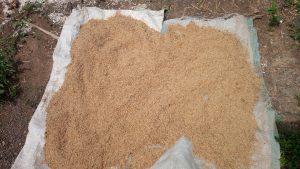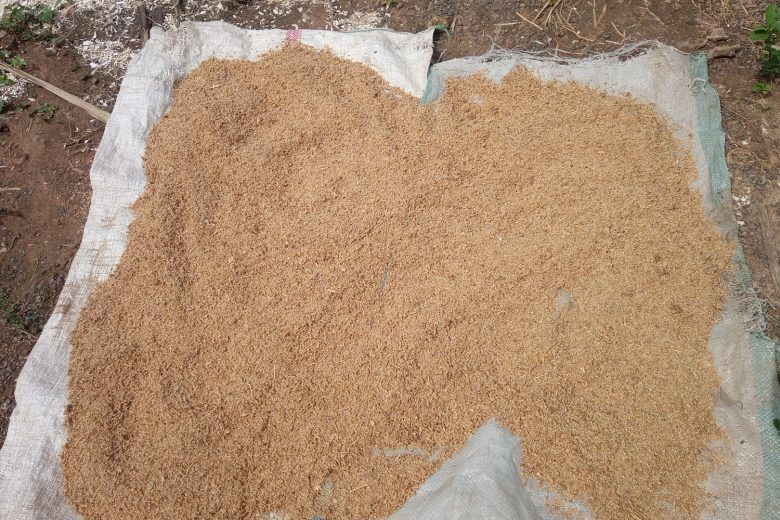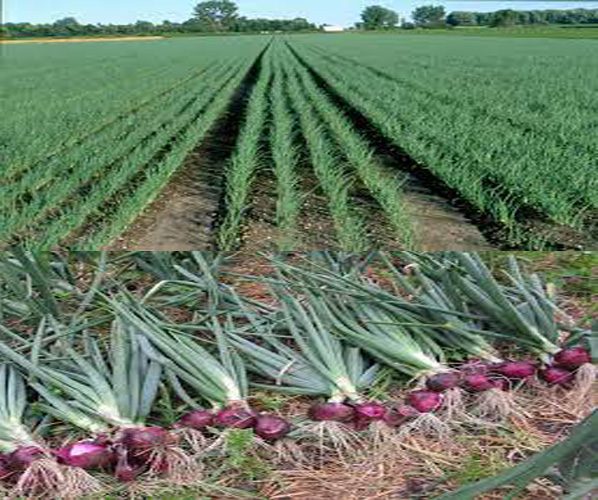To start vegetables farming in Nigeria is a lucrative venture you can consider this season. The number of people who eat vegetables daily is increasing sporadically and the number of farmers who grows it is not growing in the same ratio.
So, to start a vegetable farm on both a Small scale and large scale, you need to locate a suitable farm location, clear your farmland, spray with herbicides to avoid quick growth of weeds, and irrigate the farm with water.
So, let us get into the details of how you can venture into vegetable farming in Africa in detail shortly.
How To Start Vegetable Farm In Nigeria Step By Step Guide
Following are the procedures you need to follow to start a vegetable farming business in Nigeria;
Step 1: Locate a good farmland
Locating farmland to start cultivating your vegetable requires you to put some factors into consideration and they are;
Read Also: How To Start Beans Farming In Nigeria [Beginners Guide Pdf]
The nearness of water to the farm:
For you to be successful with your vegetable farm, you need to situate it close to a water supply. This will help reduce the cost of irrigation and the stress of spraying your plants with water.
Read Also: How To Start Poultry Farming In Nigeria [Full Guide]
Good topsoil:
If you’re planting vegetables on farmland that has lost its nutrient, it will tell on the look of the vegetables. in time of harvest. So, be on the lookout for a fertile ground before you buy farmland to start your farming.
Read Also: How To Start Beans Farming In Nigeria [Beginners Guide Pdf]
Step 2: Select the specie of vegetable you want to venture into
In Nigeria today, there are different types of vegetables that are been consumed on daily basis.
You can choose from any of the following:
- Waterleaf
- Fluted Pumpkin
- Scent leaf
- Amaranthus hybridus
- Cabbage
- Broccoli
- Cauliflower
- Spinach
- Peas
- Beans
- Cherry tomatoes
- Herbs
- Lettuce
- Tomatoes
- Okra
- Brinjals
- Pumpkins
- Watermelons
- Carrots
- Radishes
- Beetroots
- Potatoes
- and Onions.
But the most commonly farm ones are;
Amaranthus hybridus
Fluted Pumpkin
Ugwu
Related Read: How To Start Fish Farming In Nigeria [Step By Step Guide]
Step 3: determine the size of your farm
Choosing the area and size of your farm is another factor you need to consider.
You may want to venture on large scale, you may decide to venture on a small scale, and you may decide to do backyard vegetable farming.
Read Also: How To Start Cucumber Farming In Nigeria [ Beginners Guide Pdf]
Step 4: Clear your farmland
You must ensure your new farm area is clear. First, you must cut the grass, park it, and burn the grass.
Ensure you remove hard shrubs, underground roots, stems, and hardwood that may hinder free movement on your farm.
Step 5: You will need to make ridges on your farm
To make your vegetable grow well and enhance better productivity, you need to make ridges on the farm.
Read Also: How To Grow Onions Anywhere In Nigeria [Beginners Guide]
Step 6: Get Vegetable seeds.
You need to get the seed of the vegetables you will be planting.
In the below image, the seed shown is the seed of Amaranthus hybridus which is commonly referred to as Green or pigweed and Yoruba people call it Arowojeja or SoKo.

Step 7: Plant The Seed
Most vegetable seeds are planted by spraying in the air and scattering on the area you wish to grow them.
Read Also: How to start catfish farming Business In Nigeria {Beginners Guide}
Step 8: Keep watering it
Next thing is to keep an eye on the farm, ensure you water it daily If you plant during the dry season and you may not need watering if you have abundant rain.
Step 9: Spray the farmland with herbicides
To take away the stress of weeding weeds frequently that may deter the growth of your vegetable, you may need to pray the farm with systemic selective herbicides.
This will reduce the rate of weed growth.
Step 10: Harvesting
Most vegetables are matured between 4weeks to 6weeks and are ready for harvesting and selling.
You should go to your farm to harvest your vegetable after it’s mature and ready for Harvesting.
Video of how to start a vegetable farming business in Nigeria:
Most Profitable Vegetables To Farm In Nigeria
Following is the list of vegetables that sell quickly in Nigeria.
Amaranthus hybridus:
This vegetable is predominantly grown in the southern and middle areas of Nigeria.
Amaranthus hybridus is commonly referred to as greens in the English language, It is called Arowojeja in Yoruba dialect while the Igbos called it Inine and it is commonly known as Alefo in Ghana.
Fluted Pumpkin ( Ugu):
Telfairia occidentalis commonly referred to as Ugu is a common vegetable leaf common to the southeastern part of Nigeria. It is grown, cooked, and eaten for its health benefits.
The Ibibo and Efik people commonly referred to this vegetable as ikong-ubong. Venturing into this type of vegetable farming is a gold mine.
Read Also: How To Start Pig Farming In Nigeria {Beginners Guide}
Spinach:
This is another commonly grown vegetable here in Nigeria. This vegetable is common in the South West area of Nigeria.
It is known as Amunututu in the Yoruba dialect, Igbo people called it Akwukwo nri and is commonly referred to as Ganye alayyafo in Hausa dialect.
Scent Leaf:
This leaf is a multi-purpose serving vegetable. It is medicinal, can be cooked as soup, can be used as spicy to spice up your food, and many more.
It is commonly referred to as Effirin in the Yoruba dialect, Nchawun in Ibo, known as daidoya in Hausa, and Ntong in Efik.
Cost of starting a vegetable farm in Nigeria
To start a profitable vegetable farming in Nigeria, it will cost roughly 20,000 to 50,000 naira excluding the cost of farmland and farm clearing.
Is vegetable farming profitable in Nigeria?
Yes, vegetable farming is a profitable business to start in Nigeria and Africa at large. almost 95% of people eat vegetable within two days which make their demand high.
What is the most profitable vegetable to grow in Nigeria?
The most profitable vegetable to grow in Nigeria include Amaranthus (Green), Fluted pumpkin (Ugu), Spinach, and Scent leaf.
How do you set up a vegetable farm?
To start a vegetable farm, all you need to do is acquire farmland, clear the farm, get the vegetable seed of your choice, then start planting.
Which vegetables give more profit?
Amaranthus (Greens), fluted pumpkin (Ugu), and scent leaf are the most profitable vegetable to grow.
What vegetables grow well in Nigeria?
Amaranthus (Greens), fluted pumpkin (Ugu), and scent leaf are the vegetables that grow well in Nigeria.
How do vegetable farmers make money?
Vegetable farmers make money by selling their products to customers in the market.
How much do I need to start a vegetable farm?
To start a vegetable farm, it will cost you between 50,000 and 100,000 nairas.
How profitable is Ugu farming in Nigeria?
Ugu is one of the most sought-after vegetables in Nigeria, so, it is one of the most profitable in Nigeria.
Is okra farming profitable in Nigeria?
Yes, Okro is one of the most consumes vegetables in Nigeria making it one of the most profitable farming businesses to start.
How many days does it take Ugu to germinate?
Ugu takes less than a month to grow to maturity and be ready for harvest.
What is the best month to plant okra in Nigeria?
The best time to plant okra in Nigeria is late September,
Conclusion
Starting vegetable farming in Nigeria is a lucrative venture one can dabble into, we have given you a step-by-step guide on how you can go about it.
If you have any information not clear, you can get us informed via the comment section.





Good day and well done for the great job you are doing, please I need a guideline on carrots and cabbage farming,
Thanks
You’re from which country?
This was an insightful read, thank you but how would I recognise a fertile farmland or a good soil
Looking at the grass at the soil before clearing the bush, if the grasses are not green, if they are showing stunted growth or showing other colors that are not green except for crops that are not green in pigment. Such soil should be tested for lack of nutrients.
But in details here are what you should know.
Recognizing Fertile Farmland
Recognizing fertile farmland or good soil involves assessing various factors that contribute to its productivity.
While a comprehensive evaluation often requires expert knowledge and professional analysis, there are several indicators you can consider to get a general idea of soil quality. Here are some key aspects to look for when recognizing fertile farmland or good soil:
Soil Texture: Fertile soil typically has a balanced texture, consisting of a mixture of sand, silt, and clay. A loamy soil, which has roughly equal proportions of these three components, is generally considered ideal for most crops.
Soil Structure: Well-structured soil allows for proper root development and water infiltration. Look for soil that is crumbly, loose, and well-drained, as compacted or waterlogged soil can hinder plant growth.
Color: Fertile soil often exhibits a dark color, indicating the presence of organic matter, such as decomposed plant and animal material. Darker soils tend to be richer in nutrients.
Organic Matter: The presence of organic matter is crucial for soil fertility. It improves soil structure, retains moisture, and provides essential nutrients. Soil with high organic matter content often has a crumbly texture and a rich, earthy smell.
Nutrient Content: Fertile soil contains an adequate supply of essential nutrients for plant growth. Nitrogen, phosphorus, and potassium (NPK) are the primary macronutrients, while various micronutrients are also vital. Conducting a soil test can provide detailed information about nutrient levels.
Drainage and Moisture Retention: Well-drained soil that allows excess water to drain away is essential for healthy plant growth. At the same time, the soil should retain enough moisture to support plant roots during dry periods.
Presence of Beneficial Organisms: Healthy soil hosts a diverse range of beneficial organisms like earthworms, bacteria, fungi, and other microorganisms. These organisms contribute to soil fertility by decomposing organic matter and cycling nutrients.
Previous Land Use: Understanding the history of land use can provide insights into soil quality. Farmland that has been used for sustainable agricultural practices, such as crop rotation or cover cropping, is more likely to have maintained its fertility.
Remember that these indicators provide a basic understanding, and for a more accurate assessment, it is advisable to consult with agricultural experts or conduct professional soil tests.
Local agricultural extension offices or soil testing laboratories can provide further guidance on assessing soil quality and suitability for specific crops or farming practices.
Very educational. Thanks
It’s our pleasure to be of help